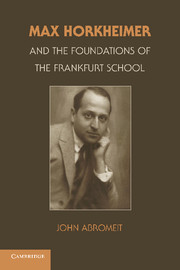Book contents
- Frontmatter
- Contents
- Acknowledgments
- A Note on References and Permissions
- Introduction
- 1 Coming of Age in Wilhelmine Germany
- 2 Student Years in Frankfurt
- 3 A Materialist Interpretation of the History of Modern Philosophy
- 4 The Beginnings of a Critical Theory of Contemporary Society
- 5 Horkheimer’s Integration of Psychoanalysis into His Theory of Contemporary Society
- 6 Horkheimer’s Concept of Materialism in the Early 1930s
- 7 The Anthropology of the Bourgeois Epoch
- 8 Reflections on Dialectical Logic in the Mid-1930s
- Excursus I The Theoretical Foundations of Horkheimer’s Split with Erich Fromm in the Late 1930s
- Excursus II Divergence, Estrangement, and Gradual Rapprochement
- 9 State Capitalism – The End of Horkheimer’s Early Critical Theory
- Epilogue
- Selected Bibliography
- Index
- References
4 - The Beginnings of a Critical Theory of Contemporary Society
Published online by Cambridge University Press: 05 June 2012
- Frontmatter
- Contents
- Acknowledgments
- A Note on References and Permissions
- Introduction
- 1 Coming of Age in Wilhelmine Germany
- 2 Student Years in Frankfurt
- 3 A Materialist Interpretation of the History of Modern Philosophy
- 4 The Beginnings of a Critical Theory of Contemporary Society
- 5 Horkheimer’s Integration of Psychoanalysis into His Theory of Contemporary Society
- 6 Horkheimer’s Concept of Materialism in the Early 1930s
- 7 The Anthropology of the Bourgeois Epoch
- 8 Reflections on Dialectical Logic in the Mid-1930s
- Excursus I The Theoretical Foundations of Horkheimer’s Split with Erich Fromm in the Late 1930s
- Excursus II Divergence, Estrangement, and Gradual Rapprochement
- 9 State Capitalism – The End of Horkheimer’s Early Critical Theory
- Epilogue
- Selected Bibliography
- Index
- References
Summary
As we have seen, Horkheimer was deeply dissatisfied with the philosophical schools that dominated German universities in the 1920s. One of the central tasks he pursued in the lectures on the history of modern and contemporary philosophy that he gave after becoming a Privatdozent in 1925 was to provide a socio-historical explanation of the origins of the dominant philosophical tendencies at that time, such as neo-Kantianism, positivism, phenomenology, metaphysics, and Lebensphilosophie. These lectures occupied much of Horkheimer’s time during this period, and they reflected his interests in important ways, but they did not represent his primary concern, particularly after 1928. Skeptical about the prospects of imminent political change and no longer satisfied with a purely aesthetic refusal, Horkheimer had originally come to Frankfurt in hopes of gaining a rigorous, scientific understanding of modern capitalist society, whose exploitative underpinnings and volatile irrational potential he had witnessed first hand during World War I. In 1928, when it became clear that he would most likely become the next director of the newly founded Institute for Social Research, Horkheimer’s latent desire to develop a critical theory of contemporary society was given new impetus. It suddenly became more important that he work out explicitly the principles that would guide him as the new director. As Horkheimer would soon make clear, under his direction the Institute would not be dedicated primarily to the history of the workers’ movement and socialist theory, as it had been under Carl Grünberg, but rather to developing a theory of contemporary society. There are no detailed statements of Horkheimer’s plans for the Institute prior to the inaugural address he delivered in 1931, “The Present Situation of Social Philosophy and the Tasks of an Institute for Social Research,” but an examination of his writings from the late 1920s goes a long way toward clarifying the evolution of the theory of society that he would outline in his inaugural address. In our examination of his lectures, we have already touched on the historical sources of some of the ideas he presents there – in the French Enlightenment and German Idealism, for example – but we have not yet explicitly examined Horkheimer’s appropriation of Marx at this time, because it took place largely in writings that were published only later, if at all. In what follows, we will examine Horkheimer’s writings from the late 1920s that illustrate most clearly his efforts to develop a Critical Theory of contemporary society. We will focus particularly, if by no means exclusively, on his interpretation and appropriation of Marx, because of their central importance to these efforts.
- Type
- Chapter
- Information
- Max Horkheimer and the Foundations of the Frankfurt School , pp. 141 - 184Publisher: Cambridge University PressPrint publication year: 2011



